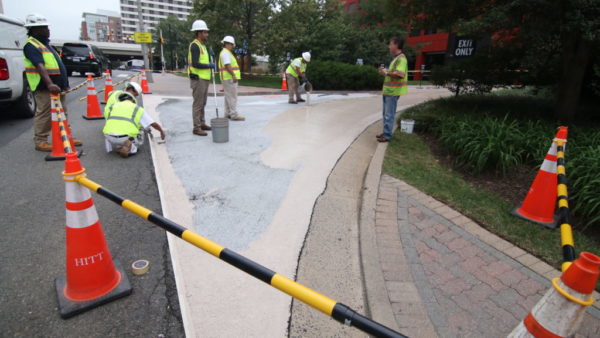Crystal City’s biggest property owner is now testing out a new pavement sealant in a bid to bring down temperatures and reduce the “heat island” effect increasingly plaguing urban areas.
JBG Smith just sealed a pair of its parking lots in Crystal City, in front of an office building at 241 18th Street S., with a new product dubbed “CoolSeal,” which is designed to bring down temperatures on the asphalt by as much as 10 degrees during even the sunniest months of summer.
The reflective pavement treatment is gaining popularity in the Southwest as a way to reduce the amount of heat bouncing off of wide swaths of pavement, though JBG officials believe this is the first time any company has tested out this particular asphalt coating on the East Coast. The company plans to study the impact of the treatment on the roughly 18,000 square feet of pavement over the next year or so, and could someday starting using at its bevy of properties across the D.C. region.
“One of the benefits of being a larger property owner with a diverse portfolio is the ability to try new things,” Brian Coulter, JBG Smith’s chief development officer, told ARLnow. “We think a lot about, ‘How do we improve the built environment and the experience of people on the ground?’ And this could really make a difference in that respect.”
Coulter says he’d never heard of CoolSeal until reading about it in a landscaping magazine a few weeks back, and the product instantly struck him as a good fit for his company.
Researchers have increasingly found that D.C. has some of the most intense urban heat islands in the country, with the high concentrations of parking lots and buildings driving up temperatures in more developed neighborhoods when summer rolls around. Coulter says he never saw the heat in Crystal City as especially problematic, but because the company owns so much property in the neighborhood, he felt it was a natural spot to test out CoolSeal on as large a space as possible.
“It’s a big enough area where you’re not just dealing with a couple parking spaces,” Coulter said. “It just felt like a continuation of some of the other experiments and interventions we’ve done there before, particularly around public art.”
JBG ended up using about 550 gallons of the coating, with workers applying it to the parking lots over the course of the first two weekends in October. The company estimates the effort cost about $50,000, in all.
Yet Coulter believes the experiment could end up being well worth the expense if it works as intended. He says the company plans to measure the sealant’s impact on the temperature on the parking lots, and the surrounding area, through the end of next summer to see how it works in practice.
Should it have a notable impact, Coulter expects JBG could use CoolSeal all throughout its properties in both Crystal City and Pentagon City, as part of the developer’s continuing efforts to link the neighborhoods together. The company has all manner of new projects underway in Crystal City, fueling Amazon HQ2 speculation with its dominance in the area, and is also backing the major PenPlace development in Pentagon City.
“We see those two areas as part of the broader neighborhood, and one way to better establish that is with the pedestrian experience,” Coulter said. “If this is done well, it will work well for the people who visit and the people who live there.”
He doesn’t think CoolSeal needs to be limited to just parking lots, either. He envisions everywhere from basketball courts to bike trails to the roofs of tall buildings being ripe for the heat-reducing treatment, and that goes for all of JBG’s properties around the D.C. area.
“We’re really excited about the possibility and potential of this,” Coulter said. “Because, clearly, if this has the type of impact we’re looking for, it really does fit in nicely with everything we’re trying to do.”


